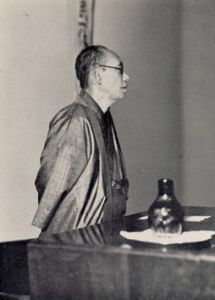The Center for Comparative Philosophy & Global Asia Initiative Joint Reading Workshop
Nishida on Well-Being: Reflections from Medieval Buddhist Philosophy
Time: 12:00 – 14:00 Thursday Oct 13th
Location: West Duke 204
** The Center for Comparative Philosophy will provide a light lunch for the workshop. The room will open from 12:00 for people to serve themselves and take a seat.
Nishida, Kitarō (1870-1945) is one of the most influential twentieth-century Japanese philosophers. Influenced by Fichte and Hegel, Nishida’s work is often compared with Lebensphilosophie [philosophy of life], the philosophical trend that arise around the turn of the 20th century. His main works include An Inquiry into the Good(1911), Intuition and Reflection in Self-Consciousness (1917), Place(1926), and The Logic of Place and the Religious Worldview (1945).
This workshop will discussNishida’s ideas of well-being, which is closely related to his philosophy of life. There are two seemingly contradictory ideas of well-being in his thought, unity and self-negation (or “dialectics”). According to Nishida, although well-being is defined by the unity of experience, it is more fundamentally characterized as self-negation. Drawing upon Medieval Buddhist philosophy, the speaker will discuss these notions in Nishida’s early essay An Inquiry into the Good (1911), and his late essay Logic and Life (1936).

